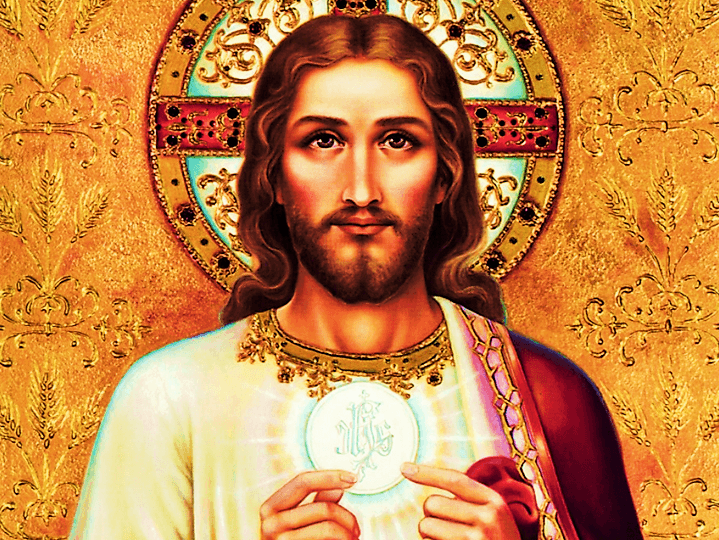SOLEMNITY OF CORPUS CHRISTI REFLECTION (A).
THE FRUITS OF HOLY COMMUNION.

HISTORY OF THE SOLEMNITY
God used Saint Juliana de Mont Cornillon to initiate this feast. Since her youth, Juliana, had a great veneration to the Blessed Sacrament. And she always missed a special feast in His honor. This desire is said to have been intensified by a vision that she had of the Church under the appearance of a full moon with a black stain, which meant the absence of this solemnity. She made this known to Jacques Pantaleon, the then Archdeacon of Liége, who later became Pope Urban IV, who proclaimed in 1264 the solemnity of “Corpus Christi” to be celebrated on the Thursday after the Most Holy Trinity Sunday, inspired as well of the Eucharistic Miracle which occurred at Bolsena in 1263, when a consecrated host began to bleed onto a corporal, as God’s way of removing the doubts of the priest who was celebrating the Holy Mass.
OUTLINE
1. Summary of ideas of today’s readings.
Today the Church remembers with supreme gratitude for the gift of the Eucharist and adoringly prostrates herself before the real presence of the Eucharist, professing her faith.
- In the 1st reading God fed the manna to the Hebrew people while they wandered in the desert (Dt 8:2–3, 14–16).
- The manna prefigures the Bread that comes down from the heaven, which will be revealed by Jesus Himself in the Gospel (Jn 6:51–58) where Our Lord Jesus Christ not only proposes a message but gives himself as food for eternal life.
“I am the living bread that came down from heaven; whoever eats this bread will live forever; and the bread that I will give is my flesh for the life of the world (v. 51).”
- In the 2nd reading, St. Paul emphasized the fact that the Holy Eucharist is a source of of unity in Christ’s Church, for although we are many, we form one body, because we all partake of the same Bread (1 Cor 10:16–17).
- As the Catechism, n. 1396 teaches: “The UNITY OF THE MYSTICAL BODY: THE EUCHARIST MAKES THE CHURCH. Those who receive the Eucharist are united more closely to Christ. Through it Christ unites them to all the faithful in one body – the Church. Communion renews, strengthens, and deepens this incorporation into the Church, already achieved by Baptism. In Baptism we have been called to form but one body.230 The Eucharist fulfills this call.”
2. The Fruits of Holy Communion
The manna during the Exodus was a figure of this Bread — Jesus Christ himself — which nourishes Christians on their pilgrimage through this world. Communion is the wonderful banquet at which Christ gives himself to us: “the bread which I shall give for the life of the world is my flesh”. These words promise the manifestation of the Eucharist at the Last Supper: ‘‘This is my body which is for you’’ (1 Cor 11:24). The words ‘‘for the life of the world’’ and “for you’’ refer to the redemptive value of the sacrifice of Christ on the Cross.
Jesus stresses very forcefully that it is necessary to receive him in the Blessed Eucharist in order to share in divine life and develop the life of grace received in Baptism.
- No parent is content to bring children into the world: they have to be nourished and looked after to enable them reach maturity.
- “We receive Jesus Christ in Holy Communion to nourish our souls and to give us an increase of grace and the gift of eternal life” (St Pius X, Catechism of Christian Doctrine, 289).
In the same way as bodily food is necessary for life on earth, Holy Communion is necessary for maintaining the life of the soul, which is why the Church exhorts us to receive this Sacrament frequently in the state of grace for the fruits of receiving Our Lord in the Holy Eucharist are numerous:
“Holy Communion INCREASES OUR UNION WITH CHRIST AND WITH HIS CHURCH. It PRESERVES AND RENEWS THE LIFE OF GRACE received at Baptism and Confirmation and makes us GROW IN LOVE FOR OUR NEIGHBOR. IT STRENGTHENS US IN CHARITY, WIPES AWAY VENIAL SINS and PRESERVES US FROM MORTAL SIN IN THE FUTURE (Compendium, n. 292).”
Dear brethren in Christ, let us thank God for his immense love for us, inventing a way to be with us and in us, through the Sacrament of the Holy Eucharist. Let us make the resolution to receive our Lord in a worth manner, that is, in the state of grace (without mortal sins), adore, love, and glorify Him in all our actions throughout the day.
Happy Solemnity of the Body and Blood of Our Lord Jesus Christ!
SEE AS WELL: TODAY’S MASS PRAYERS AND READINGS. CLICK ON THIS LINK https://catholicsstrivingforholiness.org/solemnity-of-corpus-christi-or-the-body-and-blood-of-our-lord-jesus-christ-mass-prayers-and-readings/
AUDIO CREDIT: Philippine Madrigal Singers, “Anima Christi (Bukas Palad)” in their album “Acclamation” by Sony BMG Entertainment. With permission from Sir Mark Anthony Carpio, choirmaster of UPM. Thanks, Mark!
Stay updated: subscribe by email for free TO OUR NEW WEBSITE www.catholicsstrivingforholiness.org (PUT YOUR EMAIL IN THE SUBSCRIBE WIDGET).
We are also in www.fb.com/Catholicsstrivingforholiness. Kindly help more people in their Christian life by liking our page and inviting your family, friends and relatives to do so as well. Thanks in advance and God bless you and your loved ones! Fr. Rolly Arjonillo
